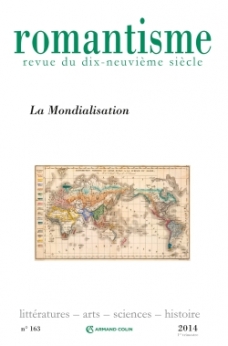
Romantisme n° 163 (1/2014)
Pour acheter ce numéro, contactez-nous
Recevez les numéros de l'année en cours et accédez à l'intégralité des articles en ligne.
La notion de « littérature mondiale » élaborée à Weimar à la fin des années 1820 a connu une postérité remarquable. Elle porte aujourd’hui encore plusieurs projets d’analyse de la mondialisation littéraire. L’examen minutieux des conditions dans lesquelles Goethe a pu rêver à la « Weltliteratur », jusqu’à l’envisager comme une coalition secrète contre le capitalisme éditorial naissant, lève un paradoxe instructif : la littérature chinoise qui a inspiré cette rêverie goethéenne d’unemondialisation littéraire par le haut a emprunté les circuits les plus commerciaux des échanges littéraires mondiaux, si bien que la dichotomie critique de la culture et du commerce, de la légitimité et du succès s’est heurtée d’emblée à un court-circuit fondateur.
The notion of “world literature”, developed in Weimar at the end of the 1820s, has been graced with a remarkable posterity. It is still the founding idea of a number of projects for the analysis of literary globalisation. The detailed study of the conditions which led Goethe to dream up the idea of a “Weltliteratur”, to the point of imagining it as a secret coalition against the nascent capitalism of the publishing industry, gives rise to a telling paradox : the Chinese literature which inspired this Goethean day-dream of a literary globalisation from the top used the most commercial of all the world literary means of exchange, so that the critical dichotomy between culture and trade, legitimacy and success, was from the first fruitfully short-circuited.

